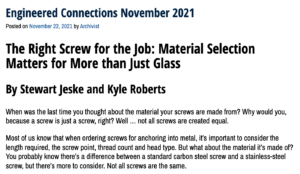 The Right Screw for the Job: Material Selection Matters for More than Just Glass
The Right Screw for the Job: Material Selection Matters for More than Just Glass
By Stewart Jeske, PE and Kyle Roberts, PE
When was the last time you thought about the material your screws are made from? Why would you, because a screw is just a screw, right? Well … not all screws are created equal.
Most of us know that when ordering screws for anchoring into metal, it’s important to consider the length required, the screw point, thread count and head type. But what about the material it’s made of? You probably know there’s a difference between a standard carbon steel screw and a stainless-steel screw, but there’s more to consider. Not all screws are the same.
Avoid Problems Before They Start
Using inappropriate fasteners in the wrong place can cause a galvanic reaction between dis-similar metals. A secondary effect of a galvanic reaction is called hydrogen assisted stress corrosion cracking (HASCC) in the screw material. This is also termed the invisible corrosion because you can’t tell that it’s happening by observing the surfaces of the connected parts. Many of the screws needed on a job have been hardened so they can be self-drilling. Typically, these screws also have a protective coating to prevent corrosion. Micro flaws and scratches in the protective coatings may occur during the installation process and allow HASCC to occur. It can be accelerated if moisture is present.
A few years ago, a client asked us to investigate a curtainwall installation that was approximately six years old. The owner was complaining about screw heads breaking off in some exposed areas of curtainwall. Ultimately, with the help of the curtainwall manufacturer and research, we determined that a common soap brand was used to clean the curtainwall and had caused a rapid deterioration of some of the fasteners through HASCC.
David Raskoskie with Alloy Fasteners says, “in order to minimize the possibility of HASCC from occurring, screws with a Rockwell hardness less than 34C should be used.” He recommends the use of 18-8 stainless steel screws or grade 5 (steel) screws. Both 18-8 stainless steel screws and grade 5 screws rely on the addition of selective hardening of the self-drilling tip and the first few threads to allow for the drilling process. He recommends a minimum of 3-5 threads penetrating past the material into which you are screwing.
Know Your Numbers
18-8 stainless steel screws refer to the 300 series of stainless steel screws; the most common are the 304 or 316 series. Stainless steel screws are known for superior corrosion resistance. However, they can begin to corrode in a salty environment. Annealed 300 series stainless screws are like annealed glass. They are not as strong as tempered glass, which can be associated with the cold-worked 300 stainless series screws. Raskoskie says the 410 stainless steel screws are only stainless by name and do not provide the same corrosion or strength requirements as 18-8 stainless steel screws. He feels these should be avoided in structural applications such as curtainwall and storefronts.
Grade 5 screws typically are more cost effective than stainless steel screws. These are a carbon steel screw made from a special alloy that is heat-treated to meet grade 5 specifications for strength. JEI recommends using manufacturers that have third-party tested their fasteners to meet International Code Council requirements.
Our recommendation is to not cut corners when it comes to the fasteners that are specified. Use fastener suppliers that have experience and understand the risks associated with galvanic corrosion and HASCC.
Stewart Jeske is president and owner and Kyle Roberts is a senior structural engineer/glazing systems engineer for JEI Structural Engineering in Kansas City, Mo.
Read this article and other great info in US Glass Magazine, December 2021
